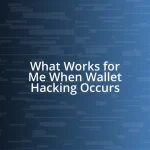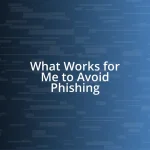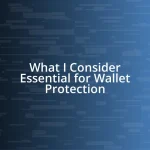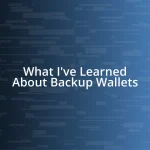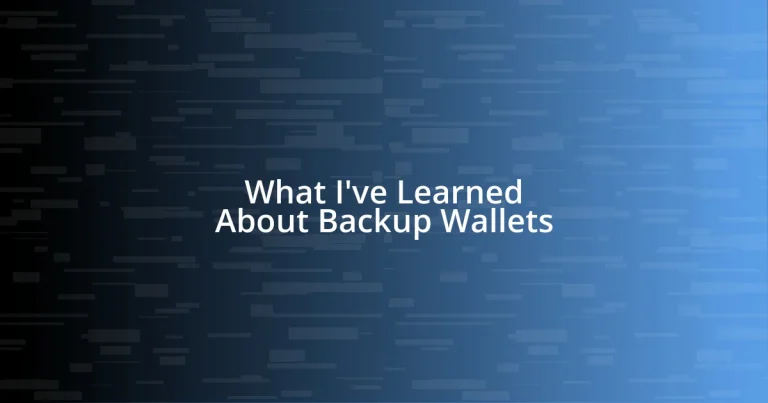Key takeaways:
- Backup wallets are essential for securing cryptocurrency investments and providing peace of mind against potential losses.
- There are three main types of backup wallets—hardware, software, and paper—each catering to different security needs and preferences.
- Implementing best practices like using multiple backup methods, strong encryption, and regular testing can significantly enhance the security of your cryptocurrency assets.
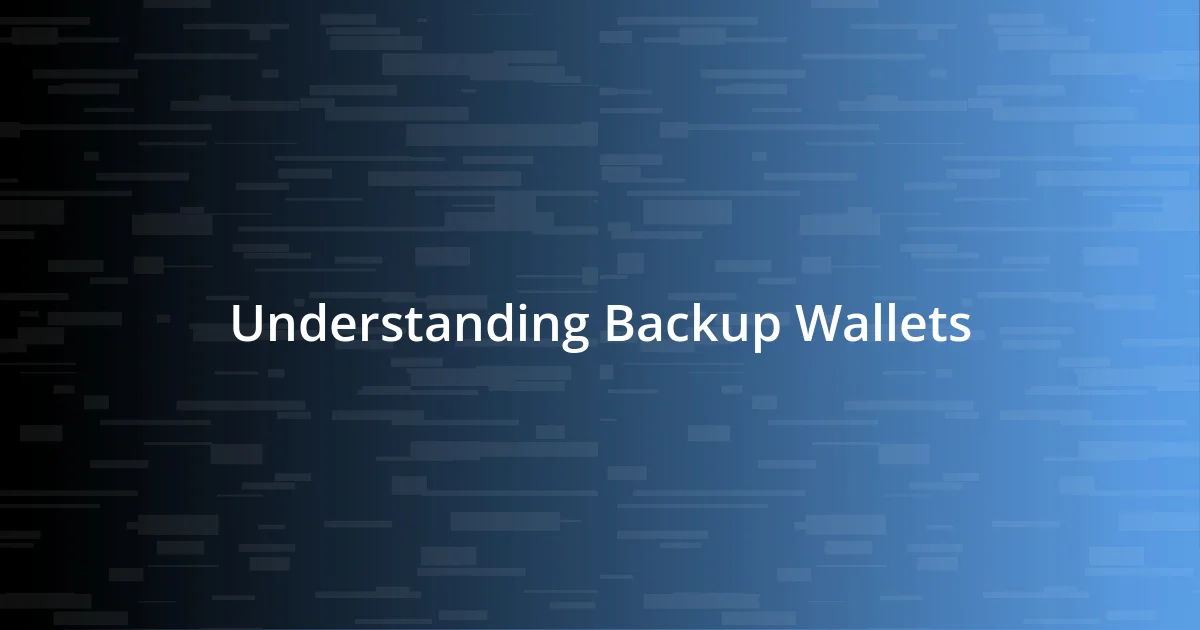
Understanding Backup Wallets
Understanding backup wallets is crucial for anyone involved in cryptocurrency. I remember the first time I understood their importance during a tense week when my main wallet faced technical issues. The sheer panic of potentially losing my funds gave me a profound appreciation for having a backup wallet ready to go—it felt like a safety net that offered peace of mind.
Have you ever considered what you would do if you lost access to your main wallet? For me, this thought was terrifying, which is why I learned to set up a backup wallet that mirrors my main account. The process can seem daunting at first, but once you get the hang of it, it’s incredibly empowering. It’s like having an extra key to your digital vault; you want to make sure that key is safe!
Backup wallets not only protect your investments but also give you a sense of security. I often find myself reflecting on the stories of people who lost everything because they didn’t back up their wallets. It’s a harsh reality, and it drives home the lesson that while we can’t predict the future, we can certainly prepare for it. Isn’t it better to take that small step now than to face huge consequences later?
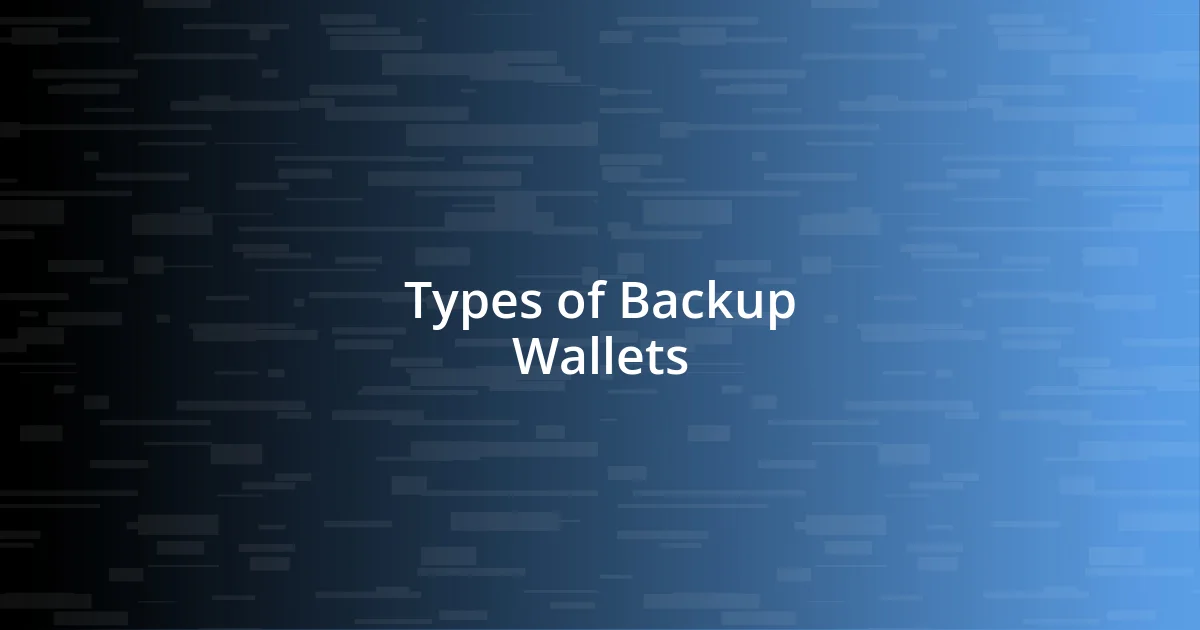
Types of Backup Wallets
When it comes to backup wallets, I’ve encountered a range of options, each serving different needs. Generally, I see three primary types: hardware wallets, software wallets, and paper wallets. It can be a bit overwhelming, but I’ve learned that choosing the right one often depends on how comfortable you feel managing cryptocurrencies.
-
Hardware Wallets: These are physical devices that store your private keys offline. I remember investing in a hardware wallet, which felt like putting my bitcoins in a safe rather than leaving them in an open drawer. It provides excellent security against online threats.
-
Software Wallets: These are applications you can install on your computer or smartphone. I started with a software wallet, and while it was convenient, I learned to be cautious with the potential for malware. It’s a good option for everyday transactions when you need quick access.
-
Paper Wallets: Essentially, these are printed QR codes that contain your keys. I once created a paper wallet for a long-term investment, and it felt oddly satisfying to have a tangible piece of my crypto portfolio. However, I quickly realized the need for careful storage to prevent damage or loss.
With these three options, you can strategize based on your own preferences and risk tolerance. I’ve discovered that a combination often provides the best balance between accessibility and security.
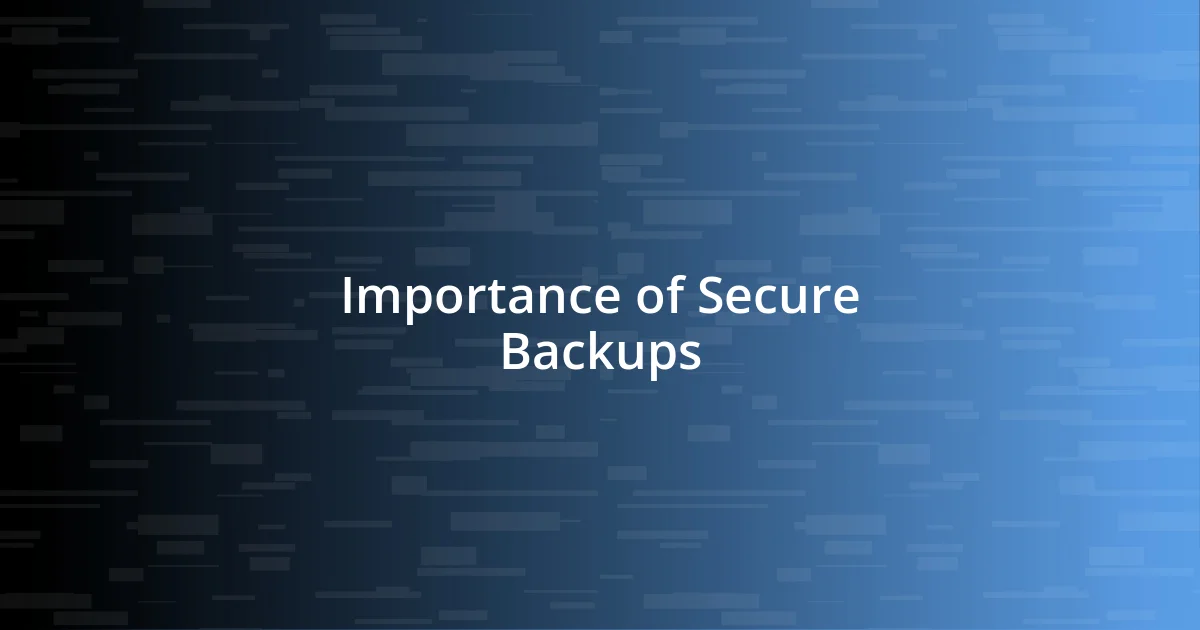
Importance of Secure Backups
Secure backups are absolutely vital in the realm of cryptocurrencies. I remember feeling the weight of uncertainty the first time I heard about the infamous hacks that had left many investors reeling. Knowing that a simple backup could safeguard my assets significantly changed my approach. It gave me peace of mind, knowing that I’ve taken steps to shield myself from possible threats.
The reality is, losing access to your wallet can be incredibly disruptive. I’ve spoken to several friends who experienced the daunting task of trying to recover their funds after system failures or forgetting their passwords. They often said that if they’d just taken the time to set up a secure backup, they could have avoided that distress. This experience taught me firsthand that a secure backup can be the difference between financial disaster and stability.
Backup wallets not only preserve your financial assets; they also protect your emotional well-being. I used to feel anxious whenever I made a large transaction. With a backup in place, I now approach transactions with a newfound confidence. It’s like having a supportive partner in your investment journey, ensuring that you are prepared for whatever comes your way.
| Backup Type | Importance |
|---|---|
| Secure | Protects assets from theft, loss, or system failure |
| Accessible | Ensures you can regain access easily if needed |
| Peace of Mind | Reduces anxiety associated with potential financial loss |
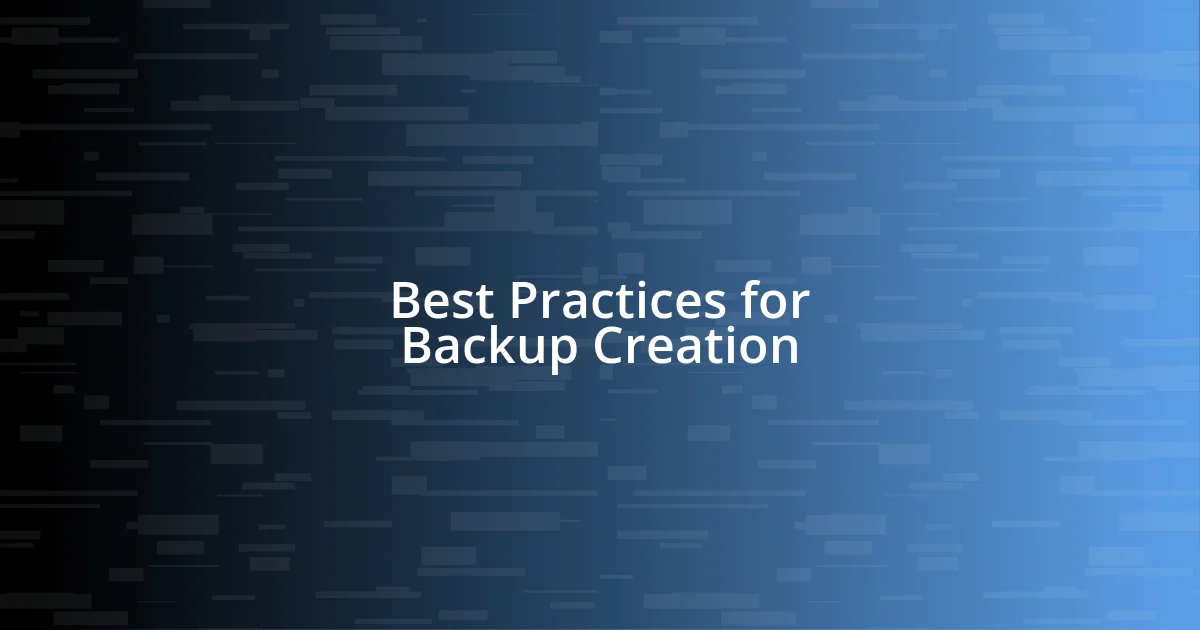
Best Practices for Backup Creation
When creating backups, it’s essential to follow a few best practices to ensure maximum security. For instance, I’ve found that using multiple backup methods can be invaluable. Imagine the comfort of having your private keys stored not just in one location but across different mediums—like a hardware wallet and a secure cloud service. This redundancy can be a lifesaver in tricky situations.
Another crucial lesson I’ve learned is the importance of encryption. After hearing a friend’s horror story about their unencrypted backup being accessed by malicious software, I decided to implement strong encryption for my own backups. It made me realize that while convenience is tempting, safeguarding my information with robust encryption gives me peace of mind. Don’t you want to ensure that your assets remain yours and only yours?
Lastly, regular testing of your backups is something I can’t stress enough. I remember the anxiety I felt when I realized I hadn’t checked my backup in months. Upon testing, I found a small issue, but it could have escalated into a major problem if left unaddressed. Regularly verifying that you can access your backups not only builds confidence but also helps catch any potential issues early on. Isn’t it reassuring to know that you’re prepared for anything?
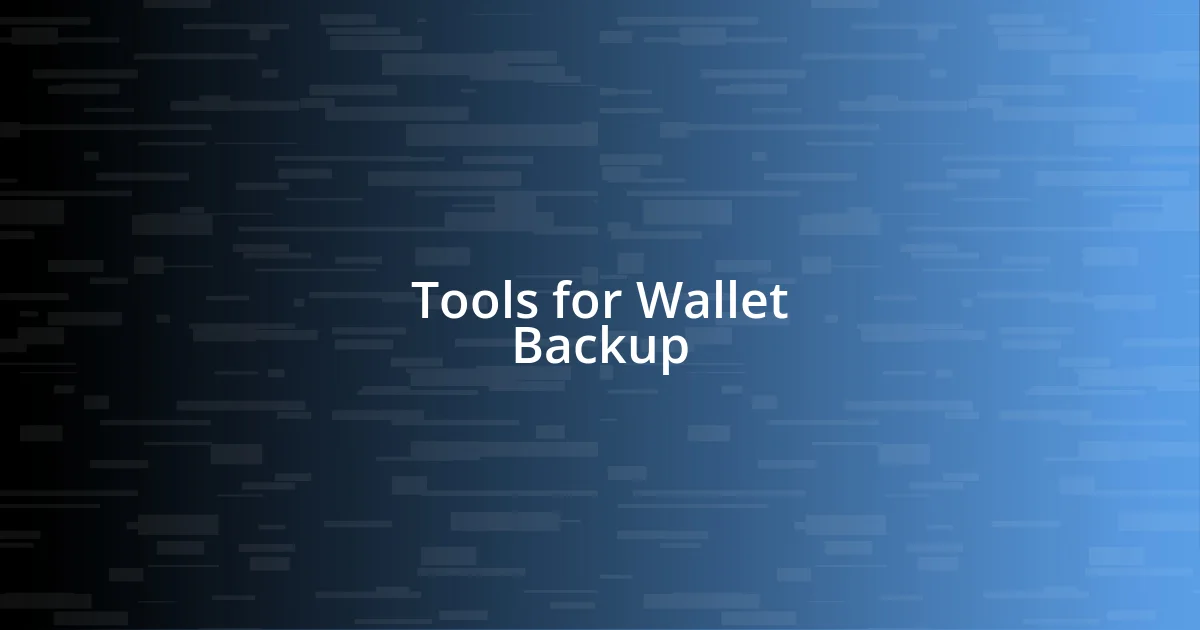
Tools for Wallet Backup
When it comes to tools for wallet backup, I’ve had a lot of positive experiences with hardware wallets. They not only keep my private keys secure but also allow for easy access whenever I want to make transactions. I remember the moment I decided to invest in one; it felt like finally locking my valuables in a safe instead of leaving them out in the open.
Another effective method I’ve explored is using secure cloud storage. I initially hesitated, fearing potential vulnerabilities in the cloud. But after setting up two-factor authentication and encrypting my files, I felt comfortable utilizing this option. It’s like having a safety net; if something were to happen to my hardware wallet, I know my data is still protected, easing my worries.
Let’s not forget about the good old-fashioned printouts. There’s something oddly comforting about holding a physical copy of my recovery phrase. I vividly recall standing at my kitchen table, meticulously writing it down on high-quality paper and storing it in a fireproof safe. It felt reassuring, almost like I was sealing a secret treasure map. How could anyone put a price on that kind of security?
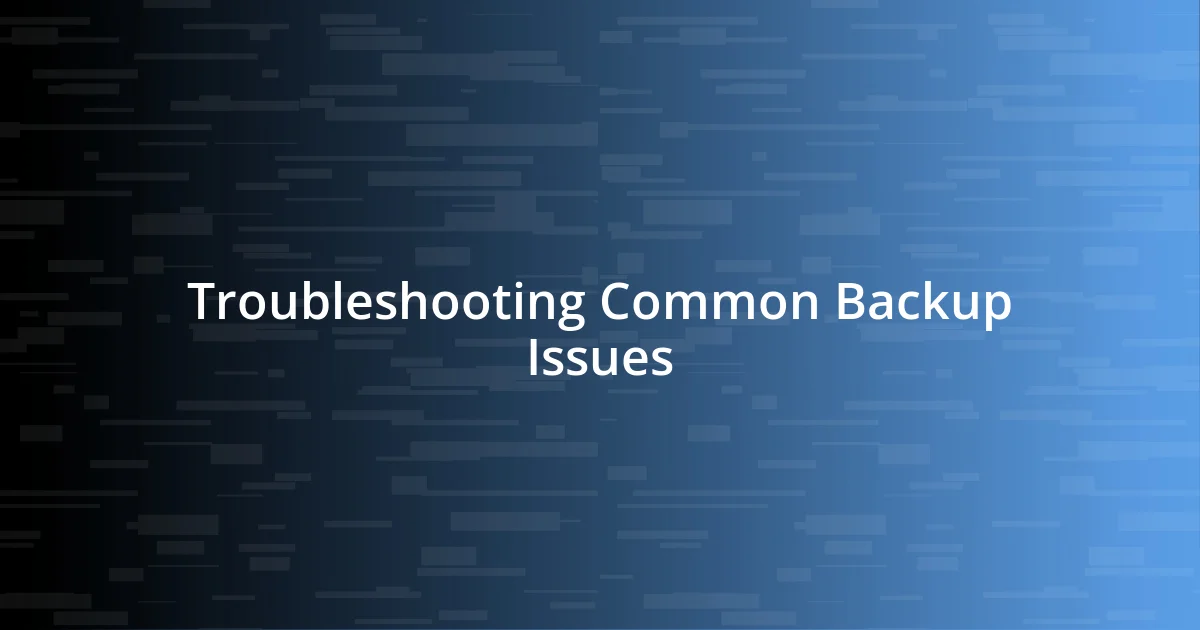
Troubleshooting Common Backup Issues
Troubleshooting backup issues can sometimes feel overwhelming, but I’ve learned a few tricks that can help ease that stress. One time, I found myself staring blankly at my computer when my wallet backup wouldn’t load. I took a deep breath and remembered that sometimes, simply restarting the device can fix bizarre glitches. It’s a small step but one that can make a big difference. Have you ever encountered a seemingly insurmountable tech problem only to realize it was something simple?
If you’re facing issues retrieving your backup, make sure you double-check the file paths and formats. I once misplaced my recovery phrase in a sea of documents, leading to a frantic search. After I organized my files into clearly labeled folders, it was like a breath of fresh air—suddenly, everything was in its rightful place. Isn’t it amazing how a little organization can save hours of stress?
Lastly, don’t underestimate the importance of community support. I remember reaching out to an online forum when I faced a particularly stubborn issue with synchronization. The friendly advice I received not only solved my problem but also introduced me to additional best practices I hadn’t considered. It made me realize that sometimes, two (or a few hundred) heads are better than one—who knows what insights others might share that can simplify your backup experience?
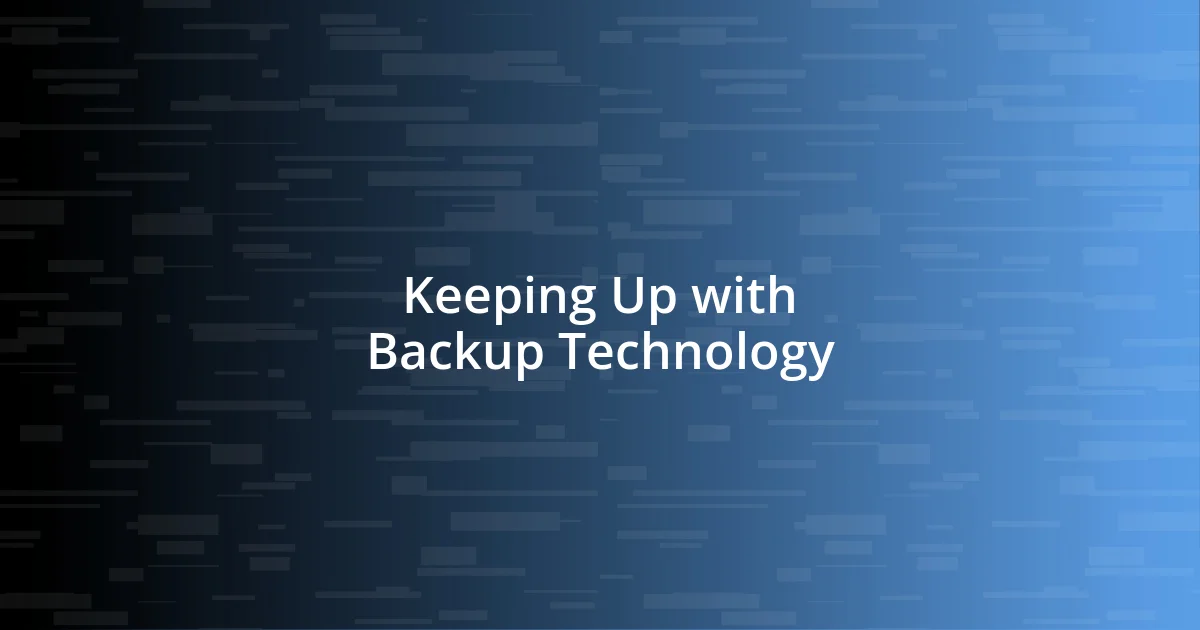
Keeping Up with Backup Technology
Keeping up with backup technology is essential to maintain peace of mind in our digital lives. I remember the first time I heard about software wallets. At first, I was skeptical; however, after integrating one with biometric security, it felt like I was stepping into the future. Doesn’t it amaze you how technology continues to evolve in ways that enhance security?
As new technologies emerge, it’s crucial to stay informed about updates and potential vulnerabilities. I’ve learned the hard way that overlooking software updates can lead to unexpected headaches. Once, I neglected an important security patch, and my wallet became compromised. Trust me, that experience taught me the value of regular maintenance—a simple task that can save you a world of trouble.
Embracing automation has also been a game-changer for me. I set up scheduled backups because relying on my memory alone was a recipe for disaster. I remember the tangible relief washing over me the first time I received a notification confirming the backup had completed successfully. It’s a simple but powerful reminder that technology, when leveraged correctly, can significantly lessen our anxiety around data security. Have you considered automating your backup process?
